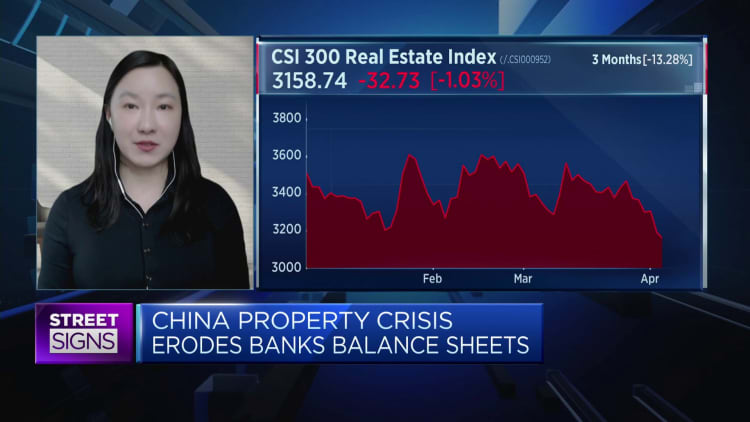Skyscrapers illuminated at night in the west coast new area of Qingdao, east China’s Shandong Province, March 22, 2024.
Nurphoto | Nurphoto | Getty Images
BEIJING – China’s real estate problems are likely far from over and the sector’s problems need to be addressed quickly if overall GDP growth is to recover significantly, according to a report released Thursday by global investment firm KKR.
That’s one of two key takeaways from the recent trip to China by the firm’s head of global and macro asset allocation, Henry H. McVey. It was his fourth visit in just over a year.
“A fundamentally oversized real estate sector must be addressed – and quickly,” he said in the report, whose co-authors include Changchun Hua, KKR’s chief economist for Greater China.
“Secondly, you need to restore confidence to bring back savings,” McVey said, stressing that this would push consumers and businesses to spend on switching to higher quality products, as promoted by Chinese authorities.
Real estate and related sectors once accounted for about a fifth or more of China’s economy, depending on the breadth of analysts’ calculations. The real estate sector has collapsed in recent years after Beijing’s crackdown on developers’ high reliance on debt for growth.
Based on comparison with real estate corrections in the United States, Japan and Spain, China’s “correction in the real estate market may only be halfway complete” in terms of depth, the KKR report said.
“Both price and volume must come under pressure to complete the cleaning cycle,” the report states. “To date, however, there has largely been a contraction in volumes.”

While KKR’s report doesn’t provide much detail on expectations for a specific real estate policy, the authors say that further actions by Beijing to improve China’s real estate sector “could materially shift investor perceptions.”
Amid geopolitical tensions, the collapse of the country’s real estate market and falling stocks have led many foreign institutional investors to consider investing in China.
“According to some of our surveys, many allocators have considered reducing exposure to China to 5-6%, compared to 10-12% today, at a time when we believe the fundamentals of the economy are likely bottoming “, says the KKR report.
Most of China’s official data from the beginning of the year exceeded analysts’ expectations.
Chinese officials have said the real estate sector remains in a period of adjustment as Beijing shifts its emphasis toward manufacturing and what it sees as “high-quality development.”
Authorities have also enacted policies to promote financial support for selected property developers, while many local governments – though not necessarily the largest cities – have significantly eased restrictions on home purchases.
Real estate resistance is moderate
KKR forecasts a modest slowdown in China’s GDP growth to 4.7% this year and 4.5% next year, with real estate and Covid-related factors halving their weight on the economy from 1.4 percentage points in 2024 to 0.7 percentage points in 2025.
“Our goal is this: with continuity [property] We see the correction and some potential further policy support as an obstacle [the] the overall economy is expected to moderate somewhat in the coming years,” McVey said in a separate statement. He is also chief investment officer of KKR Balance Sheet.
According to the report, restaurants, accommodation and wholesale trade will slightly increase their contribution to growth over the next two years, while digitalisation and the shift towards a greener, zero-carbon industry are expected to remain the main drivers of growth.
For investors, the report said a more important development than China’s rising GDP would be if authorities could make it easier for businesses and households to tap capital markets.
“Fix the weak points [the] The economy, particularly real estate, will eventually improve the cost of capital and also allow new consumer companies to access capital markets likely at better prices if real estate and confidence are doing better,” McVey said in the declaration.
Beijing in March announced a GDP target of around 5% for this year. Housing and Urban-Rural Development Minister Ni Hong said last month that developers should file for bankruptcy if necessary and that authorities would promote the development of affordable housing.
Recent data has indicated some stabilization in the real estate slowdown. The seven-day rolling average of new home sales in 21 major cities fell 34.5% year-on-year as of Monday, better than the 45.3% drop recorded a week earlier, Nomura said, citing Wind Information.
Compared to the same period in 2019, average sales were down just 27.8% as of Monday, compared to a 47% decline a week earlier, Nomura said, noting that most of the improvement occurred in largest cities in China.
Consumer perspectives
KKR said the majority of its local portfolio consists of consumer and services companies, whose businesses reflect how Chinese in the upper-middle income bracket spend modestly to improve their lifestyles.
“Revenue growth is solid, margins are holding up, and consumers are spending on less flashy items like ‘smart homes,’ pets and recreation,” the report said. “Domestic travel is also strong.”
Retail sales rose 5.5% year-on-year in January and February, better than expected, thanks to significant growth in spending for the Lunar New Year holiday.
In the long term, KKR still expects that China may follow historical precedent in changing policy to be “more investor-friendly.”
“While our message is not a clear signal to rely on,” the report states, “it reminds us – using history as a guide – that if China adjusts its domestic policies to be more investor-friendly (especially as it concerns supply-side reforms), this market could recover significantly from current levels.”